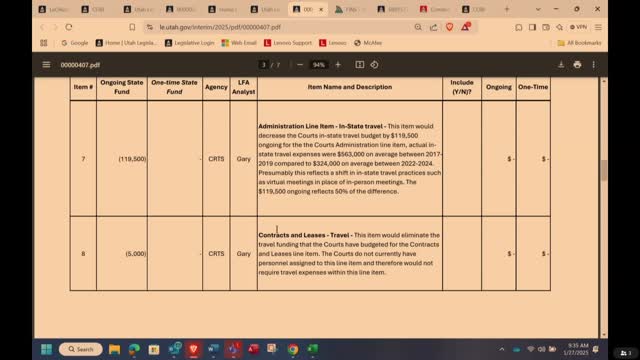Fiscal analysts outline options to repurpose nonlapsing funds, highlight court security and DPS swaps
Get AI-powered insights, summaries, and transcripts
Subscribe
Summary
Legislative fiscal analysts presented potential one-time and ongoing reallocations of unspent appropriations across courts, Department of Public Safety and flood response funds, and asked agencies for responses before the committee’s next meeting.
A fiscal analyst for the Utah Legislature on Tuesday laid out a series of options to repurpose nonlapsing balances and one-time savings in state agency budgets, including a proposed $188,000 swap with a court security restricted fund, potential savings from the Department of Public Safety’s driver license program, and a carryover of flood-response money that came in under budget.
The presentation matters because it identifies near-term funding the Legislature could reallocate to other priorities without requesting new revenues, and it asks agencies to confirm whether they support or oppose specific changes before the committee acts.
The analysts reviewed line-by-line items across multiple agencies and flagged both small and larger opportunities. For the courts, they proposed moving $188,000 of general-fund support for court security to the courts’ court-security restricted fund, saying this would “free up” the general-fund amount for the committee to reprioritize. The analyst said courts have separate physical and IT security budgets and that a court restricted fund exists specifically for court security. The analyst described that proposal as “basically a swap.”
The analysts also identified what they called small, potentially unnecessary appropriations in contract and lease line items, noting that courts have moved full-time-equivalent positions out of that line and retain spending for bonds and leases. The presentation pointed out a $5,000 state-travel amount still budgeted in a line item where personnel are no longer paid out of that account.
On the Department of Public Safety (DPS) side, analysts highlighted several one-time and vacancy-driven savings. They flagged a line with roughly $300,000 in apparent savings — an amount the analyst said is about the equivalent of 2.5 FTEs for sworn officers — and suggested the driver license program’s restricted accounts could supplant some highway-patrol spending revenue-neutral to the patrol, freeing general-fund capacity for committee priorities. The analysts emphasized that the driver-license operation is funded from public-safety restricted accounts and does not receive general fund.
The briefing also called out a 2023 appropriation for flood response: the Legislature had appropriated $10,000,000 during the 2023 general session and a subsequent special session; the analysts reported actual spending had come in about $1,700,000 under that total. The analysts described that carryover as a recommendable item for possible repurposing.
On smaller programs, the analysts noted the Guardian ad Litem program has a tighter budget and fewer staff than some other programs, and they treated proposed adjustments there as more difficult. The analysts repeatedly framed many items as options or one-time opportunities, not final decisions.
“We’re not trying to kill the incentive for them to save, but we recognize also that there is some savings,” the fiscal analyst said, explaining why some partial reductions were presented as options. The analysts asked agencies to tell the committee whether they support, oppose or have an alternative plan for each proposal and said agencies will prepare those responses for the next meeting.
Another analyst emphasized the committee’s intent to review nonlapsing balances carefully: “we encourage and we are happy to get feedback from agencies,” the analyst said, adding the committee will consider whether funds should remain with agencies for their intended purposes or be repurposed.
No formal reallocations were approved during the hearing; committee members asked no substantive questions after the presentation, and the meeting adjourned by voice vote.
The committee’s staff will collect agency responses and return to these items at a future meeting, where any proposed transfers or reductions would require formal committee action.
